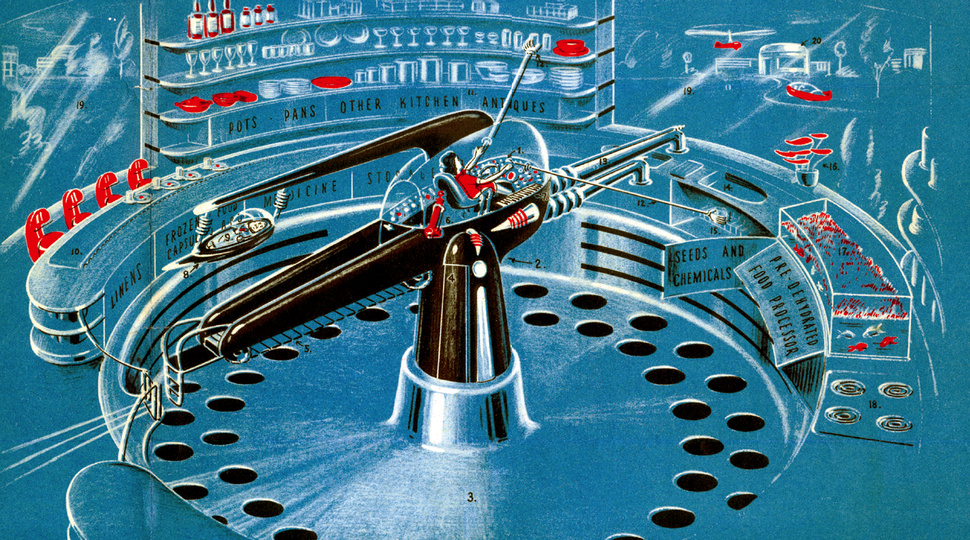At Marginal Revolution (which often has posts on the economics of the arts - you should be reading it!), Tyler Cowen points us to Paleofuture, which gives a 1940s version of the 'kitchen of the future.' We would no longer use dishes ('antiques') since our food would be processed and dehydrated. The 1960s cartoon The Jetsons imagined some similar changes in interior design, although the cooking and cleaning would be done by a robot maid. What has interested me about visions of the future is that they share a common bias: the aspect of the … [Read more...]
Taking price discrimination to the limits
The Guardian reports: While the high price of theatre tickets is well known, it still comes as a surprise to discover that some members of the audience for Arrivals & Departures, the latest play by Alan Ayckbourn, may have paid £1,500 for the privilege. This is the price of the ultimate luxury package on offer from the Stephen Joseph theatre in Scarborough; there are others on offer for £750. The £1,500 ticket involves access to rehearsals, backstage tours, Q and A sessions with Ayckbourn, as well as a seat at the finished play, about a … [Read more...]
Amazon and the independents
Two stories linked by artsjournal.com today about Amazon: gigaom.com (?) on how Amazon is further cutting prices on hardbacks, and the American Booksellers Association upset that President Obama held a major speech on jobs at an Amazon warehouse. Observations: First, while I possess no special insights into what goes on behind closed doors at Amazon, the evidence is certainly that their pricing strategy is all about market share. And I have always had trouble understanding what motivates this goal. Maximizing profits, I can understand, … [Read more...]
Taking pricing seriously
Many posts in this blog have been about how arts organizations, especially in the nonprofit or public sectors, can learn a thing or two about strategic pricing from other organizations, including non-arts commercial firms. But at The Economist, blogger Schumpeter writes that the private sector is not all that sharp when it comes to pricing either: Firms should simply take pricing more seriously: have a clear policy and make everyone stick to it. Obvious? At a recent conference organised by Simon-Kucher, the 100 or so delegates were asked to … [Read more...]
Win-win
I am working on a project, which is taking many more hours than expected. While I love the idea of spending all my summer afternoons and evenings hanging out in the backyard with my children, there are times where I simply need to get to the office to get some writing done, where editing text at the dining room table is just not going to work. There are college students in this town who are great caregivers, who could use some money to get them through the school year, and who have time on their hands in late July. I am (relatively) cash-rich … [Read more...]
Giving it away
At Slate, Matt Yglesias reports on attendance at a WNBA game in DC, wondering why the stands are not full: Now it's easy to tell a story where the demand just isn't that price-responsive and so the revenue-maximizing price doesn't generate sellouts. But this is what price discrimination is for? Where's the senior discount? Where's the kids discount? And heck, just give tickets away for free. I'd be trying to find every girls sports organization in town and give them blocks of free tickets. You'd make some money at the concession stand, you'd … [Read more...]
Do cultural districts matter?
At the Art Newspaper, Adrian Ellis claims that they do: Few cities command the accolade “great” or even “liveable” without a significant cultural presence. Today, whether the question is “Where is the best place to bring up your family?”, “Where do knowledge workers congregate?” or “What attracts inward investment?”, “Cities with a rich cultural life” is the most common answer, alongside those with good public education, low crime rates and decent transport. (They are usually the same places.) In this context “culture” usually means museums … [Read more...]
The great small plate debate
My very first post for this blog was about why for some products - cable TV, museums, Disneyland - you are made to purchase a "bundle" of items (one hundred channels, permission to visit many rooms in the museum, all the rides you can do in a day) rather than being able to buy a la carte (one or two channels, just a ticket to see the abstract expressionists, one ride on Magic Mountain). In the latter two cases it might be just too hard administratively to make it work, but that's not true of cable, where it is easy and costless for the provider … [Read more...]
Cost disease, wages and skills
Cost disease is often cited as an economic phenomenon that poses particular challenges in the arts, especially the live performing arts. In a nutshell, here is the theory: productivity is defined as the value of output produced per worker. Rising income over time depends upon rising productivity: if the economy is not producing more output, it cannot earn higher incomes. We earn more per person than our grandparents did because we produce more. Productivity has risen over time because we have more capital stock (machines and buildings and … [Read more...]
Today in background noise
Reported today on Artsjournal.com: Researchers report the soothing sounds of a Mozart minuet boosts the ability of children and seniors to focus on a task and ignore extraneous information. (Pacific Standard) Reported today on Artsjournal.com: Researchers "found that a level of ambient noise typical of a bustling coffee shop or a television playing in a living room, about 70 decibels, enhanced performance compared with the relative quiet of 50 decibels" (New York Times) Bonus video: http://www.youtube.com/watch?v=j5Y4wVWz-AQ … [Read more...]









